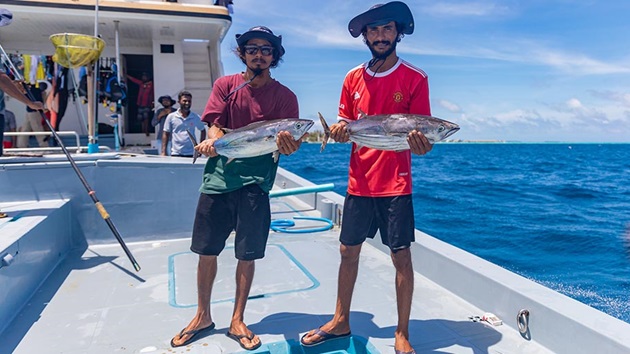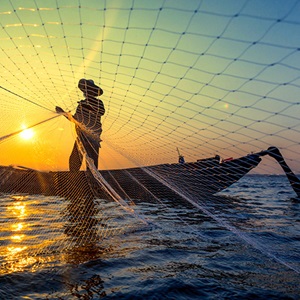The UN Sustainable Development Goals (SDGs) are 17 goals to end poverty, protect the planet, and ensure prosperity for all. Participation in the MSC program can contribute to at least five SDGs, and governments and businesses can use this as evidence of their efforts towards meeting these targets.
The SDGs provide a shared vision of the future, and a framework to guide governments, industry, non-profit organisations and the entire global community in working together for a better world. MSC certification is used by countries and organisations as part of their commitments towards delivering these targets, in particular, SDG14: on Life Below Water.
Analysis from the MSC shows that SDG14 is one of the most difficult to achieve and despite its importance, is one that has seen limited progress. As of 2023 - the halfway point towards meeting the UNSDGs by 2030 - no country was close to achieving SDG14.
Research presented at the 8th World Sustainability Forum in 2020, showed the MSC Program drives progress towards achieving five SDGs. Our work also helps efforts to strengthen food security (SDG2), promote sustainable economic growth (SDG8), promote sustainable consumption and production (SDG12), and strengthen global partnerships for sustainable development (SDG17).

Conserve and sustainably use the oceans (SDG 14)
Our vision is of the world's oceans teeming with life and seafood supplies safeguarded forever. The MSC program is recognised by the UN as an important tool to achieve the goals of SDG 14.
Committing to SDG 14 joins our efforts with the hundreds of others working to:
- end overfishing
- restore fish stocks
- protect ecosystems
- eliminate illegal, unreported and unregulated fishing
Read our voluntary commitment to ocean health from the UN Ocean Conference 2017
Read about seafood certification and the SDGs: linking ocean health with lives and plates
Food security and decent work (SDGs 2 and 8)
MSC certified fisheries aren’t just safeguarding the natural environment. They also contribute to global targets to end hunger and ensure sustainable economic growth.
Seafood provides a major source of protein to more than 3 billion people. Maintaining or rebuilding fish stocks is essential to ensure the long-term availability of food.
Many fishers have experienced economic benefits, including access to preferred markets and price premiums, as a result of MSC certification. In the South African hake fishery, certification underpins up to 12,000 jobs.
Promote sustainable consumption and production (SDG 12)
By choosing products with the MSC blue label, consumers are supporting well-managed, sustainable fisheries. This encourages retailers to stock sustainably-sourced seafood and more fisheries to improve and become certified.
Everyone can contribute to the SDGS. By choosing products with the MSC blue label you are supporting well-managed, sustainable fisheries.
Strengthen partnerships for sustainable development (SDG 17)
The MSC and other credible standard setters have a key role to play in helping companies and governments to achieve the SDGs. We can provide best practice guidance for ‘what good looks like’ in a specific industry and create roadmaps for action.
The MSC program brings together businesses, NGOs and governments to develop and implement science-based sustainability principles, criteria and measurements of progress. We are proud to be globally recognised for our multi-stakeholder approach that helps turn potential conflict into positive collaboration.
In 2017, the MSC convened 27 leading seafood businesses - Leaders for a Living Ocean - to commit to sourcing and providing sustainable seafood.
Read SDGs mean business: How credible standards can help companies deliver the 2030 agenda, a report from WWF and ISEAL.
“With marine issues crossing national borders and jurisdictions, international sustainability standards are a vital tool to conserve and sustainably manage the vast oceans.”
SDGs mean business: How credible standards can help companies deliver the 2030 Agenda
Providing data to the United Nations
Aside from its involvement with the UNSDGs, the MSC program is also used as an indicator in the UN’s framework to safeguard ocean biodiversity. This aims to protect and conserve, by 2030, at least 30% of the planet, including a reduction to near-zero loss of areas of high biodiversity importance.
Previously, data from the MSC wasis used by the UN Environment Programme and other intergovernmental organisations to track progress towards international goals to end overfishing and protect biodiversity.
In 2010, the international community set 20 targets under the UN’s Convention on Biological Diversity. These Aichi Targets mapped global efforts to conserve biodiversity around the world.
As an official biodiversity indicator partner, the MSC supplied data to help assess progress towards Aichi Targets six and four.



/biodiversity-and-fishing-spotlight.tmb-thumb300.jpg?Status=Master&Culture=en&sfvrsn=7d1e89b7_1)

